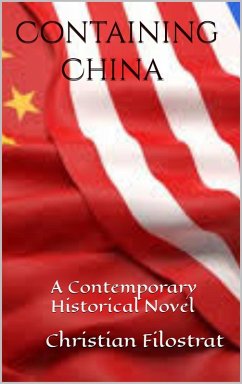In the early 21st century, China under the aegis of a communist party is expanding dramatically. Thomas Bremanger is late acknowledging China's exponential rise. When he gets to it, he is terrified; but he's at a station looking at the caboose of an already departed train. Expansions such as China's lead to geopolitical aspirations and inevitably create uncircumventable gravitational pulls. Like the impervious pitiless sun, supremacy radiates everywhere. Nations adapt to such ascendancies, not vice versa. The U.S. was in that ascendant position immediately after WWII and the rest of the 20th century. Now, Chinese industries are consuming half of the world's strategic materials, rare earth, aluminum, zinc, nickel, steel and copper. In the Congo they have a lock on the production of cobalt and a monopoly in cobalt sulfate used in the making of batteries. Chinese products are more valued than European ones. Everyone envies China. If it were democratic, Bremanger wouldn't be alarmed. But it's communist, a single party authoritarian state, perforce repressive. Opposing a country as divided against itself as the U.S. is, the Chinese Communist Party (CCP) has an open path to hegemony. The prospect of global dominance by a communist state sickens Bremanger. Too much to bear too is the risk that the West will undertake to appease China and allow the CCP to swallow Taiwan. The United States mustn't acclimate itself to this domination but contain it as it did the Soviet Union. Bremanger's dread isn't a chimera; and with anguished lucidity, he rages against the eventuality and swears to do all to neutralize it.
But his dread isn't just pointed at the CCP's ascendancy. The rise of the lumpenproletariat as a transcendent power in America, and the Republican Party's capitalizing on and leveraging that power has crippled the U.S. America is shackled by its attributes and exigencies.
Historically America's white society's dispossessed. Marx and Engels entitled the class the Lumpenproletariat - the dispossessed of European society. One feature differentiates the American lumpenproletariat from its European counterpart, however. Marx's lumpenproletariat had interest in nothing and was apolitical. Lenin reviled it for that. The American lumpenproletariat on the other hand, knowing it is the "trash" of white society, has one inalienable preoccupation - racism. Bereft of cognitive or critical evaluation racism is the American lumpenproletariat's means of dealing with the bleak reality of class. Racism empowers it to leapfrog the bottom rung of the social ladder on which no one wants to stand willingly. Whatever else racism is to the American lumpenproletariat, it is primarily the defining feature of its identity. Homegrown it is more dangerous than any outside threat. As long as the American lumpenproletariat is the Republican Party's bread and butter, the U.S. is handicapped against the CCP. But Bremanger is determined to use the imminence of the communist peril against the menace of the lumpenproletariat and its Republican Party. In effect use them against each other to overcome both.
The communists and the peril of the Republican Party's leveraging the American lumpenproletariat is a two-part account. Bremanger starts with the communists. They're rising at a rate and a level never experienced before. Unless enacted directly no strategy can contain them.
Containing China is the first part in the case study of what Thomas Bremanger attempts against these 21st century's existential threats. Distinct from the containment of the Soviets, Bremanger must use stealth at a most unexpected strategic location to achieve the containment of the CCP. Part two, The American Lumpenproletariat and its Republican Party, follows. It is the duology's more tormented segment.
But his dread isn't just pointed at the CCP's ascendancy. The rise of the lumpenproletariat as a transcendent power in America, and the Republican Party's capitalizing on and leveraging that power has crippled the U.S. America is shackled by its attributes and exigencies.
Historically America's white society's dispossessed. Marx and Engels entitled the class the Lumpenproletariat - the dispossessed of European society. One feature differentiates the American lumpenproletariat from its European counterpart, however. Marx's lumpenproletariat had interest in nothing and was apolitical. Lenin reviled it for that. The American lumpenproletariat on the other hand, knowing it is the "trash" of white society, has one inalienable preoccupation - racism. Bereft of cognitive or critical evaluation racism is the American lumpenproletariat's means of dealing with the bleak reality of class. Racism empowers it to leapfrog the bottom rung of the social ladder on which no one wants to stand willingly. Whatever else racism is to the American lumpenproletariat, it is primarily the defining feature of its identity. Homegrown it is more dangerous than any outside threat. As long as the American lumpenproletariat is the Republican Party's bread and butter, the U.S. is handicapped against the CCP. But Bremanger is determined to use the imminence of the communist peril against the menace of the lumpenproletariat and its Republican Party. In effect use them against each other to overcome both.
The communists and the peril of the Republican Party's leveraging the American lumpenproletariat is a two-part account. Bremanger starts with the communists. They're rising at a rate and a level never experienced before. Unless enacted directly no strategy can contain them.
Containing China is the first part in the case study of what Thomas Bremanger attempts against these 21st century's existential threats. Distinct from the containment of the Soviets, Bremanger must use stealth at a most unexpected strategic location to achieve the containment of the CCP. Part two, The American Lumpenproletariat and its Republican Party, follows. It is the duology's more tormented segment.
Dieser Download kann aus rechtlichen Gründen nur mit Rechnungsadresse in A, B, CY, CZ, D, DK, EW, E, FIN, F, GR, H, IRL, I, LT, L, LR, M, NL, PL, P, R, S, SLO, SK ausgeliefert werden.









